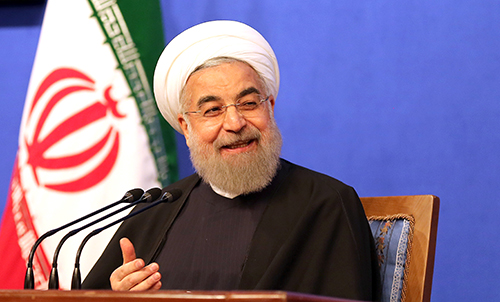The Iranian government will address the United Nation’s General Assembly this month for the last time before President Hassan Rouhani seeks re-election next year. The international appearance would be a good chance for Rouhani’s administration to discuss its record in office.
However, it is unlikely that the administration’s retreat from its commitment to reinstate the Association of Iranian Journalists or the country’s moves toward measures that could end independent journalism in the country will be on the agenda at the General Assembly, which gets underway in New York tomorrow.
The Ministry of Culture and Islamic Guidance is proposing a bill that calls for the creation of the Iranian Media System, a state-regulated organization to oversee the press. Details of the proposed bill, which were published on the ministry’s website in August 2014, resurfaced last month when they were sent to parliament, according to the official news agency, IRNA.
I join many critics, including Mehdi Rahmanian, chief editor of the reformist daily Shargh, and Ali Asghar Ramezanpour, a former deputy culture minister now based in the U.K., in the view that this government-sponsored bill would give security forces and the hardline conservative judiciary tighter control of the media.
The new media organization will replace the now-defunct independent Association of Iranian Journalists, which was established in 1997 by thousands of the country’s journalists as a mechanism to protect the press.
Exactly a year after former President Mahmoud Ahmadinejad took office in 2005, legal threats and government intimidation of the association intensified. CPJ documented how the Ministry of Labor threatened to dissolve what it described as the “illegal” group in 2008 over alleged irregularities in the way the association elected its leadership; how the government accused many of its members of inciting unrest in the aftermath of the 2009 contested presidential elections; and how a court order issued in August 2009 finally forced the Association of Iranian Journalists to shut down.
When he was elected in 2013, one of Rouhani’s campaign promises was to reestablish the Association of Iranian Journalists. But his ability to deliver on that promise, which the press regularly demanded, was blocked due to what a government spokesman described in a news conference last week as “complex and unknown causes.”
The decision to send a draft bill to parliament that essentially reinforces the negative view of independent journalists held by more hardline branches of government has led many Iranian reporters to suggest that it appears Rouhani succumbed to pressures from sections of the government, such as the judiciary and security forces, which are outside his control.
Candidates for the proposed group’s chairperson will be approved by the president after being selected by journalists on the board. The organization’s board is also set to include representatives from the government, judiciary, and Religious Seminary of Qom.
If parliament approves the bill, the Iranian Media System would be given powers including:
- Issuing of licenses, which will be available only to journalists with a minimum of two years’ experience and who have had several pieces of work published.
- Ensuring that those applying for licenses agree to the rules on how a journalist should operate, including a clause to protect national interests.
- Authority to punish journalists, including through issuing bans on practicing journalism.
- Power to punish journalists for issues including failure to observe religious or legal regulations in mass media products, non-compliance with trade and professional unions, and negligence.
- Authority to represent journalists in communication, including with foreign professionals and non-governmental bodies.
Under the proposed media system, authorities would have the power to prevent journalists with anti-state convictions from being a member of the group. This is troubling in Iran, which CPJ research shows is one of the worst jailers of journalists worldwide and where members of the press are frequently jailed, banned from working, or have outlets shut down if they don’t toe the government line. Journalists who don’t use the media system to handle communication with outside entities also risk not being protected from accusations such as “communicating with the enemy.”
The press will also be vulnerable from vaguely worded language in the draft bill around what protection will be afforded to those covering events that have not been determined legal gatherings by authorities. This confusion, coupled with a fear of being prosecuted, could lead journalists to self-censor and leave important events such as spontaneous protests uncovered.
The proposal to replace the independent Association of Iranian Journalists with an organization working under the government has led many members of the media, the association’s former board members, and academics and lawyers to say that if the bill is voted into law, they will view it as an end to independent journalism in Iran.
A vote has not yet been scheduled and the government can withdraw the draft bill at any time before that vote. Journalists are currently able to comment on the proposed bill, but many have said they are angry that the draft was sent to parliament for approval before their comments were taken into consideration.
